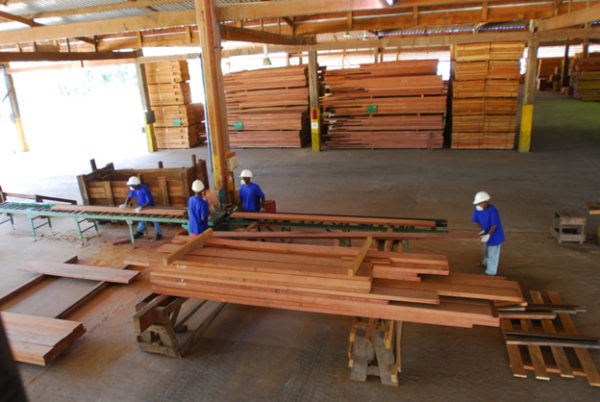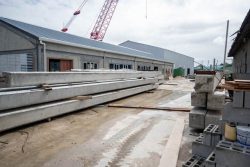In light of Barama Company Limited’s decision to end its forestry operations, an estimated 500 workers are expected to be laid off within the next three months, according to General Manager Mohindra Chand.
While the company embarks on retrenchment over the next three months, Chand said that within that time he is hoping that Barama can work out a “very supportive investment agreement” with the government. He also stressed that on the whole, Guyana is not very competitive on the value-added market and that would have to change if the government wants more from the sector.
Barama announced on Wednesday that it would not be seeking a renewal of its 25-year-old forest concession agreement with government and would be scaling back its operations.

Speaking to Stabroek News yesterday, Chand, who had just returned from a meeting with some of the company’s employees at Buck Hall, stated that approximately 500 of the company’s 800 workers would be affected in the transition.
Of the total workforce, he noted, 15% are foreigners.
Earlier in the year, the company retrenched a total of 180 workers, while blaming a drastic market slowdown and waning investor confidence due to government’s protracted review of the concession agreement.
Chand said the company has already started to meet with staff to inform them of the decisions that have been made and so far they have been received very well. “The meeting [at Buck Hall] was received well and this is not a development which they were suddenly notified of. As we went along, we updated them,” he said, while adding that staff was very understanding.
He mentioned that the company is currently in talks with the government and the Guyana Forestry Commission to ensure that all legal requirements are followed. The Department of Labour is also being kept up to date as they move along, he added.
In a brief statement issued yesterday, the Ministry of Social Protection said that in light of Barama’s decision to adjust its operations in Guyana, it has invited the company along with the last known recognised trade union for discussions pertaining to the possible impact the move is likely to have on the workers’ futures.
With reference to the company’s assets, Chand explained that they have not made a decision on what will be done as they are focused on meeting all of their obligations and closing their forest operations in accordance with the legal requirements.
Value-added viability
According to Chand, it will take up to three months to shut down the forest operations and the company is expected to be finished by January 15. “…It should be finished by then or any time before and we are hoping for it to be as efficient as possible,” he said.
“Our primary interest is to ensure that we close the forest (operation) in a proper manner and once that is concluded, we are going to sit down and strategise how we are going to make the downstream viable,” Chand explained, while pointing out that they will be asking the government to consider a new agreement for value-added products. “…We are looking at dimensional lumber, veneering and plywood,” he added.
While the company had announced that it would still continue with its sawmilling and veneering and plywood manufacturing, Chand explained that the sustainability of those also depends on the market situation.
He noted that there are a lot of factors, including the cost of production and efficiency and availability of raw materials, which affect whether they would be able to sustain the value-added sections of the company. “Because we have a surplus in materials, we won’t feel the impact now since we are focusing on trying to sell what we have but when we go into full production of value-added, then we will know exactly where we stand,” he added.
Negotiations took too long
The Ministry of Natural Resources (MNR) on Thursday said it will be engaging with Barama in further discussions on its stated interest in the continuation of the value-added activities, while also reviewing the value of the company’s 25-year-old investment to citizens.
According to the ministry, while discussions for the renewal of the concession agreement had started over a year ago and Barama was provided with a draft agreement for review and negotiations, the company communicated its decision to not renew since it had concluded that it was no longer viable to continue in the forestry operations in view of prevailing global prices.
However, while Chand said that the company was not blaming the government for the decision against renewing the concession agreement, a source explained that the government’s slow pace in negotiations was the main reason why Barama opted out.
“The whole process with engaging with the government and negotiations took too long and over that length of time the economic situation took a drastic downturn and they were being kept updated on all of that,” the source said.
“They are saying that the company got the draft agreement but that was more than a year later and every effort was made to have an efficient and effective negotiation but it ended up taking too long,” the source added, while explaining that if the government had taken less time with the negotiations, then most likely the company would have renewed the contract.
The source added too that the draft contract that was presented to the company was “tough” and said it should be made public as other companies may also have to face similar conditions.
The Ministry of Natural Resources previously said that in 2015, at the request of Barama for a renewal of its contract, Cabinet gave its ‘no objection’ to the continuing of the arrangement but recommended the convening of a Task Force to examine the request. This Task Force was seen as necessary given the “rapacious activities” of some foreign companies operating in the forests of Guyana, and “some not so positive observations that had been expressed about Barama in particular,” the ministry had said in a statement.
The statement said that the Task Force met on several occasions and visited Barama’s operations at Buck Hall, Essequibo, following which the legal consultant began reviewing the existing contract, forest concessions, and tax incentives previously granted to the company, while other members evaluated workers’ rights, value-added operations and environmental management practices, among other things.
The Task Force’s findings have not yet been made public.
Barama set up here in 1991 in a controversial deal that gave South Korean and Malaysian investors control of a lowland, mixed tropical forest concession of approximately 1.6 million hectares in the North West region of Guyana. It had had a chequered history with the authorities, facing fines and questions about limited value-added activities in recent years.






